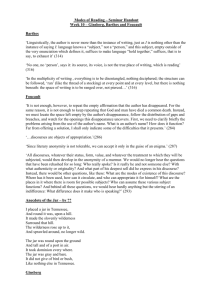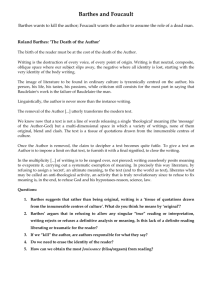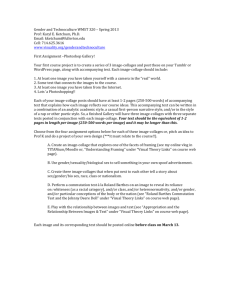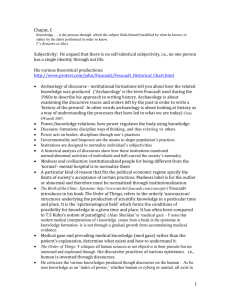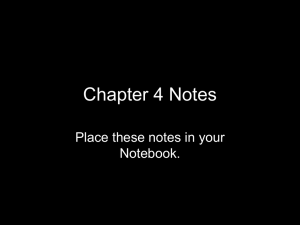Questioning Authorship
advertisement
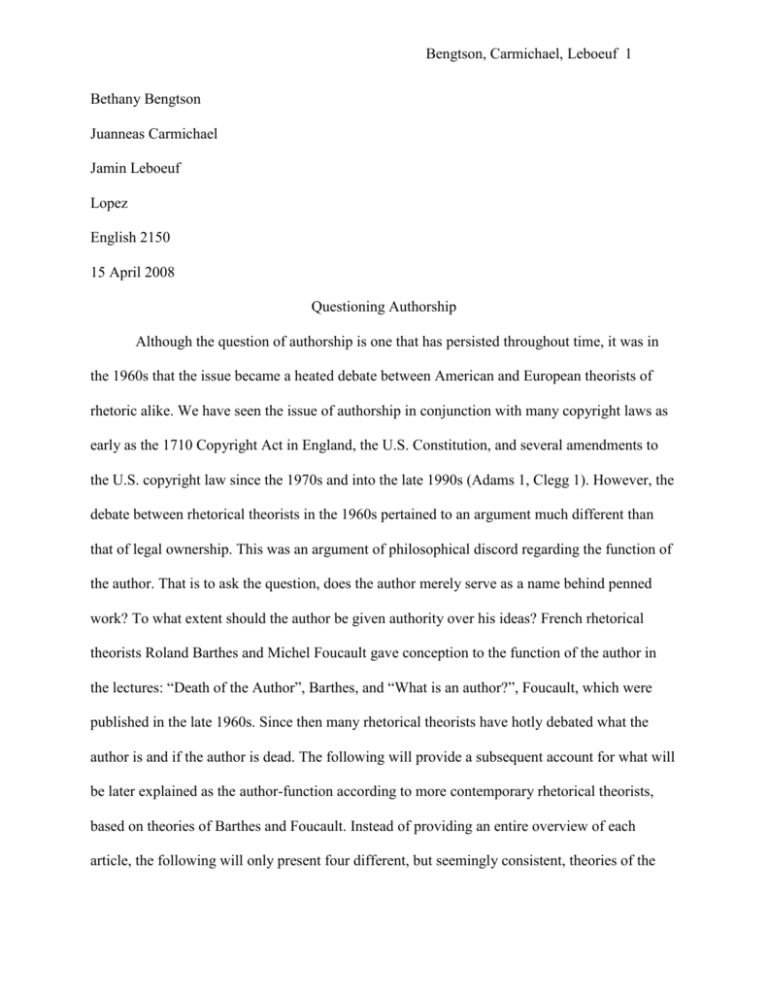
Bengtson, Carmichael, Leboeuf 1 Bethany Bengtson Juanneas Carmichael Jamin Leboeuf Lopez English 2150 15 April 2008 Questioning Authorship Although the question of authorship is one that has persisted throughout time, it was in the 1960s that the issue became a heated debate between American and European theorists of rhetoric alike. We have seen the issue of authorship in conjunction with many copyright laws as early as the 1710 Copyright Act in England, the U.S. Constitution, and several amendments to the U.S. copyright law since the 1970s and into the late 1990s (Adams 1, Clegg 1). However, the debate between rhetorical theorists in the 1960s pertained to an argument much different than that of legal ownership. This was an argument of philosophical discord regarding the function of the author. That is to ask the question, does the author merely serve as a name behind penned work? To what extent should the author be given authority over his ideas? French rhetorical theorists Roland Barthes and Michel Foucault gave conception to the function of the author in the lectures: “Death of the Author”, Barthes, and “What is an author?”, Foucault, which were published in the late 1960s. Since then many rhetorical theorists have hotly debated what the author is and if the author is dead. The following will provide a subsequent account for what will be later explained as the author-function according to more contemporary rhetorical theorists, based on theories of Barthes and Foucault. Instead of providing an entire overview of each article, the following will only present four different, but seemingly consistent, theories of the Bengtson, Carmichael, Leboeuf 2 author-function. These four author-functions are (1) a reiteration of cultural values, (2) a reiteration of the complexity of humanity, (3) an immortalized person in time and place, and (4) a person non-resistant to personal knowledge and experience biases. Before further delving into the author-functions, it must be made clear what an authorfunction is. Foucault explains that the author plays a role as a function of discourse and that the author should no longer be the conventional figure that it has been illustrated as over time. Rather, the author should be a concept which captures the discursive role played by the writer of a text (Wilson 341). More clearly, the author-function is a role played by the person, culture, or historical period who has given birth to a seemingly original concept. At this point it is important to point out that Barthes and Foucault differ severely in their arguments about the author, whether it was dead and who or what he was. However, as will be proved with further explanation, Barthes and Foucault seem to agree on one key aspect of the author-function. That is, the author does not function as an originator of concepts but merely reflects already conceived concepts. According to Foucault the author functions as a reiteration of cultural values. Foucault argues, “…the author has been previously seen as ‘a privileged moment of individualization in the history of ideas, knowledge, and literature, or in the history of philosophy and science’ ” (Wilson 343). On the contrary, Foucault resumes, the author merely states, perhaps in a new or individual way, concepts that have already been conceived in history, philosophy, culture, or literature. It is as if, later described by Barthes, the author is seated at a desk with the History of Literature and Art, an Outline on Practical Medicine, a Treatise on Psychology, and an anthology on of proverbs on life, death, suffering, women, ages of man, etc while he is writing” (Harris 10). A conceivably contemporary example may help define this function better. The concept of Bengtson, Carmichael, Leboeuf 3 Socialism, although it came to gain great popularity, was not conceived by Karl Marx. Rather, the first socialistic societies that are seen in literature can be traced back to Thomas More’s, Utopia. Furthermore, the concept of a society based on communal ownership of property can be traced back to the tribes seen in ancient texts. Held in this light Foucault’s argument of the author-function, that being a reiteration of cultural values, seems to stand true. One must ask oneself, what then is an original concept? Communism? Although Barthes holds this same view, the author functioning as a reiteration of cultural values, Barthes seems to offer a solution to this supposed problem of the author-function. As described before, the author functions only as a mirror of already conceived concepts. Barthes’ solution lies in the reiterating of the complexity of humanity (Harris 11). The best writing advice, given to all beginning writers, is to write what you know (Harris 7). Barthes argues that, for beginning writers and seasoned writers, what you know is something that is fluid and everchanging (Harris 7). This epistemic fluidity is what Barthes describes as the complexity of humanity (Harris 11). Furthermore, the ability to mirror humanity, in all of its complexities, is the aim of all good literature (Harris 11). For Barthes, the question of style was how to do something besides such a recycling of truisms and clichés, how to forge something new out of a language which is never wholly our own, which always comes to us secondhand, its forms and meanings set and used by countless others before us. What he came to value, then, was unorthodoxy: writing which resisted being read too easily, whose meanings and voices were too many and complex to be reduced to a single point or moral or explanation (Harris 11). In this light, according to Barthes, the author functions merely as a reflection of the complexities of humanity. Both Foucault and Barthes held a severely philosophical view of the function of the author, yet Foucault still offers a more practical function of the author. That is, the author Bengtson, Carmichael, Leboeuf 4 functions as an immortalized person in time and place (Freundlieb 312). An example can help define this concept. As an author and his works become popular and widely read over the years, his works become canonized (Freundlieb 312). This act of canonization gives such popularity to the author that he most likely begins to be referred to by his surname only like “Steinbeck” (Freundlieb 312). At this point the author formerly known as “John Steinbeck” loses his identity only to be referred to thereafter by his surname (Freundlieb 312). This new identity, along with the author’s works, becomes canonized and subsequently, immortalized(Freundlieb 312). This immortalizing of authors can be seen plainly in the style of writing with which these authors are referred to in any rhetorical setting. Authors are written about in the present literary tense. When referring to any author it is always written that “Steinbeck writes” and not “Steinbeck wrote” even if the act of writing actually occurred in the past. In this way, even though Steinbeck may be dead, the author has achieved a status where he is actively writing, and actively playing a role in the future as if he were still alive. While this author-function is seemingly apparent, and needs no further explanation, this analysis brings light to an intriguing question, who decides which authors should be immortalized and on what grounds? While Foucault offers no simple explanation, his point is to shake the grounds with which the literary canon has been founded. Often called a de-humanizer by his critics, it seems that in describing this author-function he has adequately shaken the grounds with which our literary canon has been so steadfastly secured. The last author-function described will be examined in the light of writing historical texts. This author-function describes the author as a person who is not resistant to personal knowledge and experiences. This seems rudimentary. However, the problem lies in perceiving scientific or historic texts as hard-fast truth without first taking into consideration biases of the authors (Wells-Jopling 71). Based on the author-functions previously described, Rebecca Wells- Bengtson, Carmichael, Leboeuf 5 Jopling conducted an empirical study concerning the way with which adolescents receive certain historical texts as hard-fast truths (65). Jopling writes, “For students, reading history was not a process of puzzling about authors’ intentions or situating texts in a social world but of gathering information, with texts serving as bearers of information (70).” Jopling further explains that adolescents (a term which she uses interchangeably with “students”) read a certain text and perceive it as hard-fast truth without first contemplating the biases that accompany every author (71). Furthermore, detecting where one author’s voice ends and another begins is imperative to reading (71). Jopling concludes that identifying these voices and understanding where they come from is a reader’s right and obligation (72). This author-function, seemingly as practical as the third author-function, also calls forth the theme that has interwoven itself throughout all four author-functions mentioned. That is, who is the author? What is the author? And should I trust this author? As it has been seen in analysis of previous author-functions, Jopling, Barthes, and Foucault seem to give no clear answer to these questions. Although, Foucault, Barthes, and Jopling seem to offer no clear answers to these philosophical questions that tear into the heart of rhetoric, perhaps the point is simply to ask questions. A close study of ancient rhetoric reveals a similar attention to the relationship between rhetoric and authorship. Sometimes it was the relationship between good rhetoric and the goodness of the rhetor. However, often there was discussion of authorship and its relationship to truth. Such questions were asked: does the rhetor provide exposition of original concepts or merely reiterate already conceived concepts (Herrick 24)? James Herrick discusses, “Does rhetoric discover truth? Or, does rhetoric simply provide one the means of communicating truth discovered by other means?” (24). Further inspection of ancient rhetoric finds the Sophists hold a relativistic view of truth in which “truth emerged from a clash of arguments” (Herrick 39). In Bengtson, Carmichael, Leboeuf 6 juxtaposition, Plato holds a more philosophical view of truth which is “transcendent and absolute” (Herrick 63). Much later, the medieval preacher rhetors contend that “rhetoric assists the preacher to discover divine truth…” (Herrick 127). None of these seem to adequately answer the question of the relationship between truth, exposition of original concepts, and authorship. Perhaps it is difficult to answer these questions because, in my experience, it has never been fully answered by the teachers of rhetoric and writing. There is good reason for this; the best teachers seem to be the ones that present information, as un-biased as possible, and allow for the students to decide which theory seems best to them. This style of teaching allows the teacher to explain truths and define original concepts in their own words, and orally “author” the truths and concepts. Allowing the student then to decide which theory seems best in effect transfers authorship from the teacher to the student. In this way, the seemingly original concepts become muddled with the students personal experience and knowledge and are not original at all. They are merely a reiteration of the teacher’s exposition. This is the same as I have done in the previous pages; presented seemingly an original concept that there are no original concepts and added my own analysis to that concept. The question regarding truth, exposition of original concepts, and authorship lies in this; I provided no original concept, I simply reiterated those by Foucault and Barthes, and my analysis came from previous study of the philosophical definition of a concept. Who or what then was the author of this essay? It certainly was not I; perhaps the author is dead.
